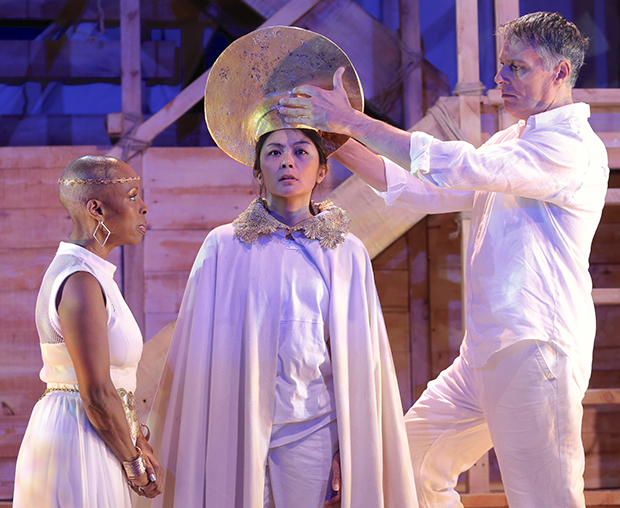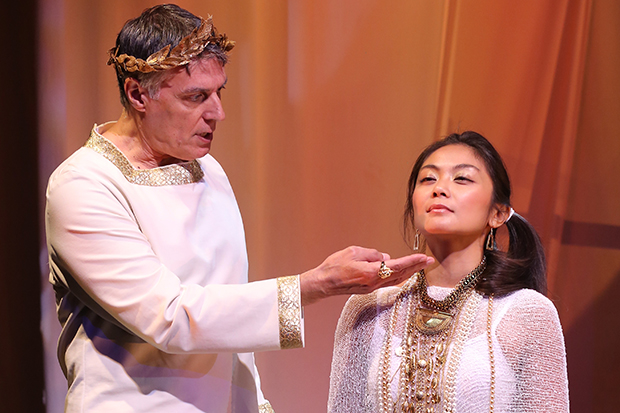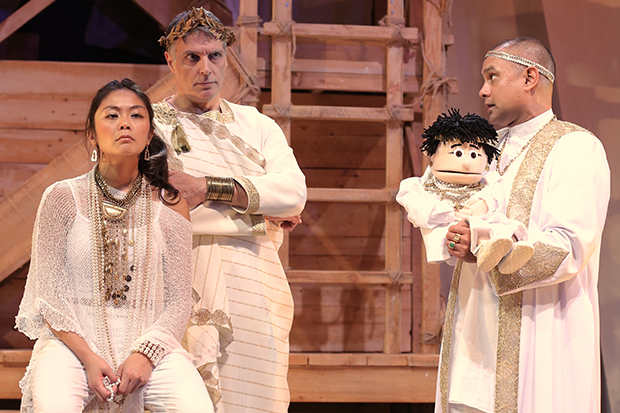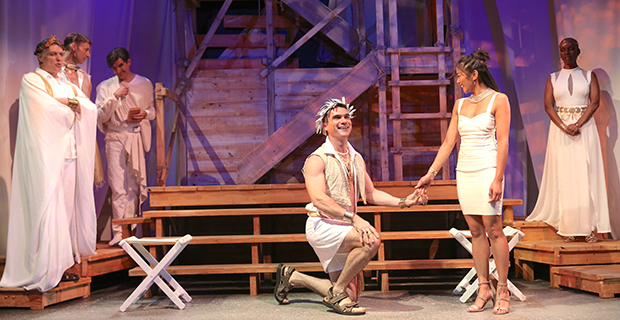A Young Woman Attaches Herself to an Older Man for Power in Caesar and Cleopatra
Bernard Shaw’s history play receives an off-Broadway revival.

(© Carol Rosegg)
When Shakespeare considered the ancient Egyptian queen Cleopatra, he saw her great romance with the Roman general Mark Antony as the aspect of her life ripest for dramatization. But Bernard Shaw, predictably, saw things differently: His 1899 play Caesar and Cleopatra, now receiving a serviceable off-Broadway revival from Gingold Theatrical Group, is about Cleopatra's relationship with another Roman — and it is far from romantic.
The play begins with a teenage Cleopatra (Teresa Avia Lim) hiding in a sphinx from the invading army of Caesar (Robert Cuccioli, convincingly Julian). Not knowing what Caesar looks like, she unwittingly leads the "old gentleman" (Caesar is past 50) back to her palace, where he reveals himself as the Roman dictator. Taking a shine to the young scamp, Caesar teaches Cleopatra to walk and speak with the authority of a queen, much to the consternation of her nurse, Ftatateeta (Brenda Braxton), and Pothinus (Rajesh Bose), a eunuch hoping to rule Egypt through Cleopatra's kid brother Ptolemy (here portrayed by an Avenue Q-style puppet). Cleopatra grows up quickly as she confronts the possibility that the only way she can rule Egypt is at the pleasure of a foreign man.

(© Carol Rosegg)
The themes of Caesar and Cleopatra, specifically the power dynamic between an older man and the younger woman he is "creating," make it feel like a rough draft for Pygmalion. Caesar and Cleopatra is never quite as illuminating as that later play, although Shaw does have some interesting things to say about the cycle of violence that becomes self-perpetuating under an occupying army (the British had fought two Afghan wars by the time he wrote Caesar and Cleopatra).
The show benefits from director David Staller's smartly shaved adaptation: He dispenses with the prologue (delivered by the god Ra) and Shaw's alternative to the prologue (in which the exposition is delivered by soldiers), and instead elevates Ftatateeta to the role of narrator. This artistic liberty allows Staller to provide his audience with needed context, even if Ftatateeta's magical chanting and talk of "sacred spirits" feels decidedly un-Shavian.

(© Carol Rosegg)
Staller's staging is respectable, but not as funny as it wants to be. The bit with the Ptolemy puppet falls flat, and Lim's annoying kid-sister performance in the early scenes feels straight out of a 1950s sitcom (maybe That's My Cleo!), but without any of the laugh lines. Her performance becomes much stronger later, though, revealing her character's journey from little girl to queen.
Still, the repetition of the ludicrous name "Ftatateeta" is humorous enough, and "Let us name the holy city, and consecrate it with Lesbian wine" is a line that could have been written by Charles Ludlum 70 years later. The best way to make Caesar and Cleopatra actually funny would be to emphasize the camp that naturally inhabits the script, something this production only achieves intermittently.

(© Carol Rosegg)
Tracy Christensen's costumes point the way: The wide-open collars and gold jewelry don't so much suggest the ancient world, but a white party on Mykonos. Dan Domingues's heavy eye makeup and flamboyant performance as Apollodorus the Sicilian (something of a Ptolemaic personal assistant) does the same. Fake torchlight flickers behind Brian Prather's tree-fort set, giving the stage a DIY feeling. Sound designer Frederick Kennedy cinematically underscores the proceedings with distant trumpets and braying mobs. It all suggests a future of Cecil B. DeMille epics (and perhaps Shaw's own flopped 1945 film adaptation of Caesar and Cleopatra, starring Vivien Leigh). It certainly made me think of several movies I would have rather been watching.
See Caesar and Cleopatra if you are a Shaw completist — you may not have another opportunity to see this ho-hum historical comedy for a long time.









